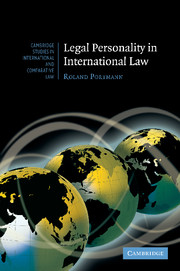Book contents
- Frontmatter
- Contents
- Foreword
- Acknowledgments
- Table of Cases
- List of Abbreviations
- Introduction
- Part I The concept of personality in international law
- Part II The conceptions of personality in international law: their origins and legal manifestations
- Part III A framework for personality in international law
- 10 Appraisal of the conceptions and their assumptions
- 11 An individualistic and formal frame of reference
- Conclusion
- Bibliography
- Index
- Titles in the series
- References
10 - Appraisal of the conceptions and their assumptions
Published online by Cambridge University Press: 05 October 2010
- Frontmatter
- Contents
- Foreword
- Acknowledgments
- Table of Cases
- List of Abbreviations
- Introduction
- Part I The concept of personality in international law
- Part II The conceptions of personality in international law: their origins and legal manifestations
- Part III A framework for personality in international law
- 10 Appraisal of the conceptions and their assumptions
- 11 An individualistic and formal frame of reference
- Conclusion
- Bibliography
- Index
- Titles in the series
- References
Summary
This section starts with a short summary. Afterwards, the assumptions informing the different conceptions of international personality are related to the respective positions in present international law.
Recapitulation
It has been argued in the preceding analysis that assumptions about the nature of statehood and the role of individuals therein as well as about the sources of international law primarily inform the conceptions of international personality. In practice, these different assumptions have been substantiated by stating (expressly or by implication) different presumptions concerning which social entities are international persons and, in some instances, by attaching certain legal consequences to this status. It is convenient to encapsulate these insights in the following table presenting the conceptions with respect to their founders, original assumptions, main practical manifestations and the presumptions as well as consequences substantiated in the latter.
For now, the relevant column is the one enunciating the original assumptions that underlie the conceptions of international personality. As the table indicates, these assumptions differ in several respects. The four most pertinent differences concern
(1) the nature and the powers of the state,
(2) the relationship between statehood and individual freedom,
(3) the role of legal sources not derived from state will, and
(4) the relationship between the actual and the normative as a matter of international law.
- Type
- Chapter
- Information
- Legal Personality in International Law , pp. 245 - 270Publisher: Cambridge University PressPrint publication year: 2010

